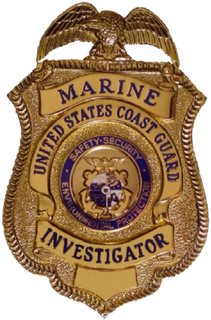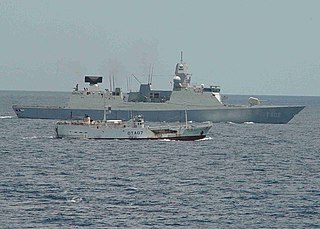
Maritime transport and fluvial transport, or more generally waterborne transport, is the transport of people (passengers) or goods (cargo) via waterways. Freight transport by sea has been widely used throughout recorded history. The advent of aviation has diminished the importance of sea travel for passengers, though it is still popular for short trips and pleasure cruises. Transport by water is cheaper than transport by air, despite fluctuating exchange rates and a fee placed on top of freighting charges for carrier companies known as the currency adjustment factor. Maritime transport accounts for roughly 80% of international trade, according to UNCTAD in 2020.

A coast guard or coastguard is a maritime security organization of a particular country. The term embraces wide range of responsibilities in different countries, from being a heavily armed military force with customs and security duties to being a volunteer organization tasked with search and rescue without law enforcement authority. In most countries, a typical coast guard's functions are distinct from those of the navy and the transit police, while in certain countries has similarities to both.

The United States Merchant Marine refers to either United States civilian mariners, or to U.S. civilian and federally owned merchant vessels. Both the civilian mariners and the merchant vessels are managed by a combination of the government and private sectors, and engage in commerce or transportation of goods and services in and out of the navigable waters of the United States. The Merchant Marine primarily transports cargo and passengers during peacetime; in times of war, the Merchant Marine can be an auxiliary to the United States Navy, and can be called upon to deliver military personnel and materiel for the military. Merchant Marine officers may also be commissioned as military officers by the Department of Defense. This is commonly achieved by commissioning unlimited tonnage Merchant Marine officers as Strategic Sealift Officers in the United States Navy Reserve.

The Maritime Safety Administration of the People's Republic of China is a government agency which administers all matters related to maritime and shipping safety, including the supervision of maritime traffic safety and security, prevention of pollution from ships, inspection of ships and offshore facilities, navigational safety measures, administrative management of port operations, and law enforcement on matters of maritime safety law. It was also responsible for marine accident investigation. It is headquartered in Dongcheng District, Beijing.
A Marine surveyor is a person who conducts inspections, surveys or examinations of marine vessels to assess, monitor and report on their condition and the products on them, as well as inspects damage caused to both vessels and cargo. Marine surveyors also inspect equipment intended for new or existing vessels to ensure compliance with various standards or specifications. Marine surveys typically include the structure, machinery and equipment and general condition of a vessel and/or cargo. It also includes judging materials on board and their condition. Because certifications and subsequently payments are processed only after the surveyor has expressed his or her satisfaction, a marine surveyor holds a prestigious position and is held with much regard in the shipbuilding industry. Marine Surveyors are highly qualified and technically sound and are usually selected after thorough evaluation procedures as vessels ranging from small ferries to enormous crude oil carriers and cruise liners are approved to sail into the high seas based purely on their judgment, competence and integrity.

A Maritime Safety and Security Team, or MSST, is a counter-terrorism team of the United States Coast Guard established to protect local maritime assets. It is also a harbor and inshore patrol and security team that includes detecting and, if necessary, stopping or arresting submerged divers, using the Underwater Port Security System. It is the only special operations group that can arrest submerged divers.
The Maritime Transportation Security Act of 2002 (MTSA) is an Act of Congress enacted by the 107th United States Congress to address port and waterway security. It was signed into law by President George W. Bush on November 25, 2002.
The United States Coast Guard is the coastal defense, search and rescue, and maritime law enforcement branch of the United States Armed Forces and is one of the country's eight uniformed services. It carries out three basic roles, which are further subdivided into eleven statutory missions. The three roles are:

USCG Marine Investigators carry out all the statutorily mandated investigations of commercial vessel casualties and reports of violation that require a determination for apparent cause and culpability (fault). The findings of Coast Guard Marine Casualty Investigations are used to create safety recommendations to prevent future marine casualties. It is imperative that commercial vessel operators understand and follow the Marine Casualty reporting requirements as outlined in Title 46, Code of Federal Regulations, Part 4. Without timely and truthful reporting, the Coast Guard is hampered in its ability to conduct an accurate investigation. Therefore, responsible parties that fail to report Marine Casualties as required by regulations are subject to civil penalties.
Maritime security is concerned with the prevention of intentional damage through sabotage, subversion, or terrorism. Maritime security is one of the three basic roles of the United States Coast Guard has gradually developed in response to a series of catastrophic events, which began in 1917.

A sea captain, ship's captain, captain, master, or shipmaster, is a high-grade licensed mariner who holds ultimate command and responsibility of a merchant vessel. The captain is responsible for the safe and efficient operation of the ship—including its seaworthiness, safety and security, cargo operations, navigation, crew management, and legal compliance—and for the persons and cargo on board.

The National Cargo Bureau (NCB) a not-for-profit marine surveying organization charged with assisting the U.S. Coast Guard with carrying out the provisions of the International Convention for the Safety of Life at Sea. The NCB was formed by a group of marine underwriters and the Coast Guard for the purpose of reducing losses of grain ships. Any ship loading grain in the US sailing for a foreign port must have a certificate issued by the NCB in order to sail( See U.S. Coast Guard Navigation and Vessel Inspection Circular No. 5-94 - NVIC 05-94 ). The NCB acts with and enforces the regulations of the Coast Guard in this area. Grain ships have unique stability issues and are prone to capsize if loaded improperly. Headquartered in New York City, the NCB has offices throughout United States.

Maritime security operations (MSO) are the actions of modern naval forces to "combat sea–based terrorism and other illegal activities, such as hijacking, piracy, and slavery, also known as human trafficking." Ships assigned to such operations may also assist seafaring vessels in distress. These activities are part of an overall category of activities which fall short of open warfare called military operations other than war (MOOTW). MSO also involve the marine environmental protection, creating a safer and clean environment.
Sector Commander is the position title of the commanding officer of a United States Coast Guard Sector, usually of the rank of Captain (O-6). The Sector Commander's second-in-command is the Deputy Sector Commander. Also reporting directly to the Sector Commander are the Command Master Chief (CMC), the Senior Reserve Officer, and the Sector's Auxiliary Coordinator.
A Sector is a shore-based operational unit of the United States Coast Guard. Each Sector is responsible for the execution of all Coast Guard missions within its Area of Responsibility (AOR), with operational support from Coast Guard Cutters and Air Stations. Subordinate commands within a Sector typically include Stations and Aids-to-Navigation (ATON) Teams. Some Sector commands also have subordinate units such as Sector Field Offices and Marine Safety Units that are responsible for mission execution in parts of the Sector's AOR. There are 37 sectors within the Coast Guard.

United States Coast Guard Activities Europe (ACTEUR) is a Coast Guard Marine Safety unit located in Schinnen, The Netherlands.
In the United States, several federal agencies and laws have some jurisdiction over pollution from ships in U.S. waters. States and local government agencies also have responsibilities for ship-related pollution in some situations.

Rear Admiral (ret.) Craig E. Bone is a former government executive under President George W. Bush, playing a key role in the forwarding of maritime domain awareness works, inter alia the container security initiative and implementation of the Maritime Transportation Security Act, as part of the wider Global Maritime Intelligence Integration Plan of this administration.

Marine Science Technician (MST) is an enlisted rate in the United States Coast Guard. They are specialists in enforcing Federal Maritime Laws for Marine Safety, Marine Security, and Environmental Protection.

A sailor, seaman, mariner, or seafarer is a person who works aboard a watercraft as part of its crew, and may work in any one of a number of different fields that are related to the operation and maintenance of a ship.












